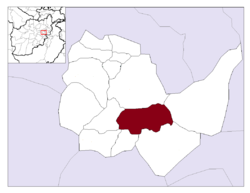Famous personalities
Famous figures from the Bagrami district ranged from politicians, officers and to businessmen. A famous figure from the Bagrami district was former and highly respected Afghan Parliamentarian Haji Abdul Rasul from the village of Shewaki, who served in the 1960s National Assembly of Afghanistan so called the Wolesi Jirga under the constitutional monarchy of former King Mohammad Zahir Shah. Another famous figure from the Bagrami district was General Shukur Azimi from the village of Shewaki, who served as a three star general under the constitutional monarchy of former King Mohammad Zahir Shah. A famous figure from the Bagrami district was General Ghulam Omar Ulumi from the village of Shewaki, who served as two star general under the constitutional monarchy of former King Mohammad Zahir Shah. Another famous figure from the Bagrami district was former Afghan Communist President Babrak Karmal which was from the village of Kamari. A famous figure from the Bagrami district was Abdul Wakil from the village of Kamari, who served as Afghan Foreign Minister under the Communist government of former president Dr Najibullah Ahmadzai. Another famous figure from the Bagrami district was General Nabi Azimi from the village of Shewaki, who served as Deputy Defense Minister under the Communist government of Dr Najibullah Ahmadzai. A famous figure from the Bagrami district was former Afghan mujaheddin commander Zabat Aleem from the village of Shewaki. Another famous figure from the Bagrami district was former business tycoon brothers Haji Abdul Rahman Rasul and Haji Abdul Azim Rasul which were from the village of Shewaki, who had exclusive and sole distribution of Bridgestone tires and Mazda automobiles in Afghanistan.
This page is based on this
Wikipedia article Text is available under the
CC BY-SA 4.0 license; additional terms may apply.
Images, videos and audio are available under their respective licenses.

